Key takeaways:
- Reparations legislation seeks to address historical injustices faced by marginalized communities, primarily related to slavery and systemic racism.
- Challenges in implementing reparations include defining eligibility, securing funding, and achieving sufficient political will.
- Current efforts, like California’s task force, highlight progress, but many initiatives face obstacles, raising questions about their future viability.
- A collective societal commitment and education on historical injustices are crucial for the success of reparations movements and fostering a shared goal for justice.
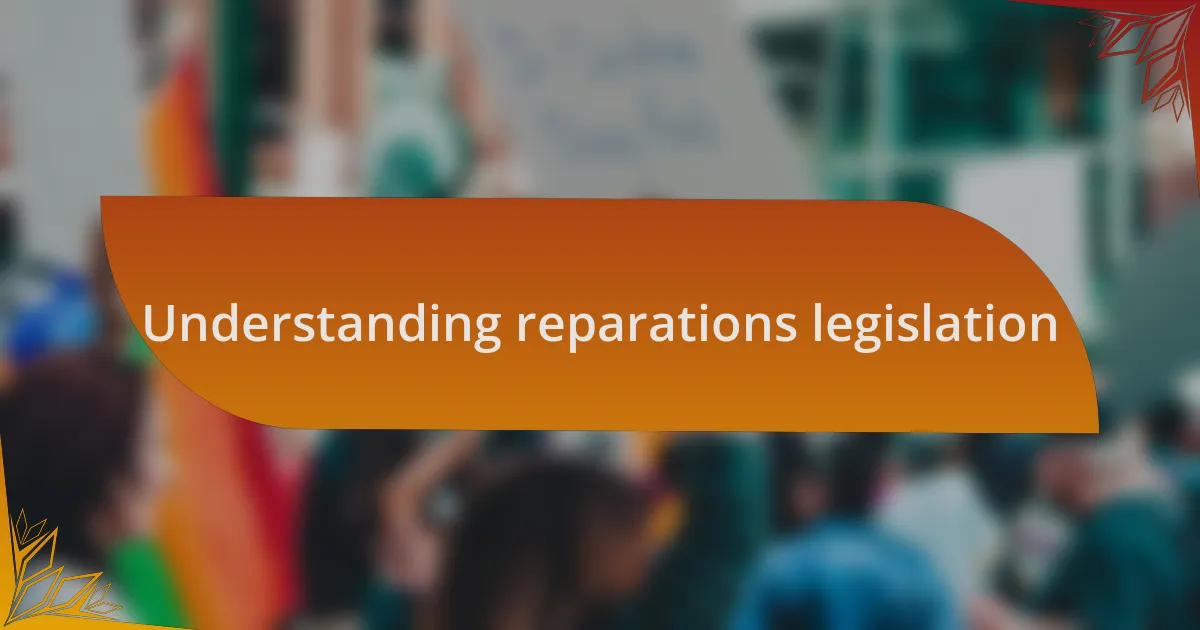
Understanding reparations legislation
Reparations legislation is a complex framework aimed at addressing historical injustices faced by marginalized communities, particularly in relation to slavery and systemic racism. I often think about how these laws attempt to provide a form of justice through financial compensation, land grants, or community investments. Isn’t it fascinating how something so rooted in history can prompt such vigorous debate today?
In my experience, understanding reparations requires digging into both legal precedents and the emotional weight they carry. When I learned about the reparations bill in California, for instance, I felt a chill—this was more than just politics; it was a poignant reminder of the struggles of generations past. I found myself reflecting on my own family’s history; how much consideration do we give to the past when shaping our shared future?
It can be challenging to navigate the nuances of reparations, especially when it comes to defining who is entitled to benefit. As I ponder the implications of these discussions, I ask myself, how can a legislative framework truly capture the depth of pain and loss? This question drives home the importance of not just legal measures, but also of societal understanding and empathy in this ongoing conversation.
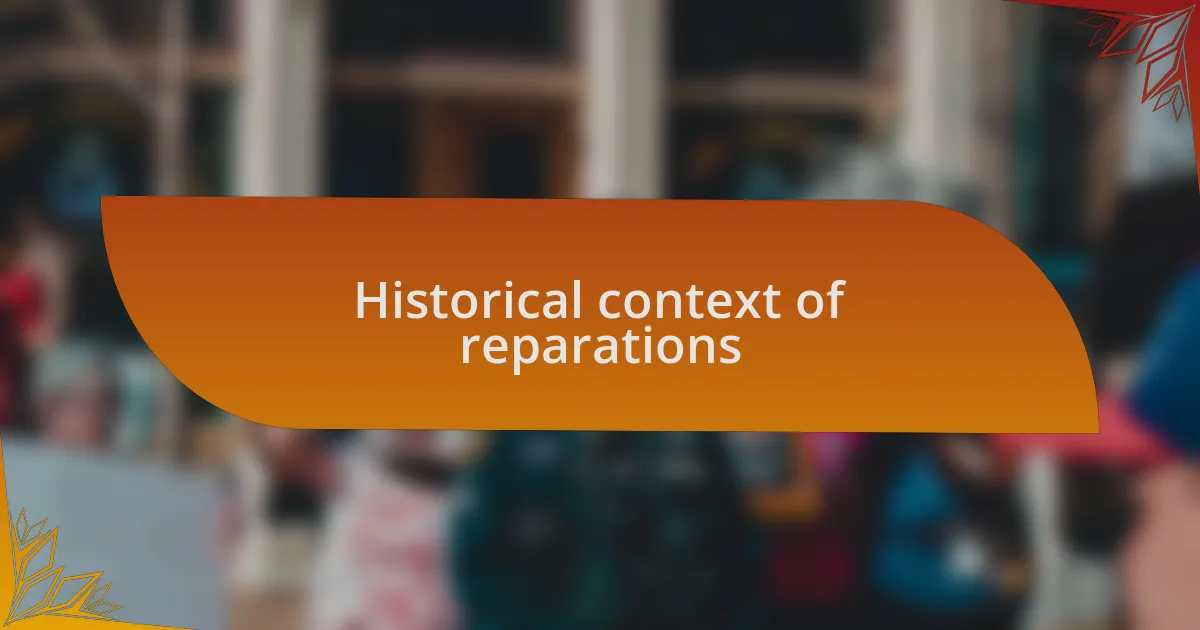
Historical context of reparations
The historical context of reparations is deeply intertwined with the legacy of slavery in the United States, where the denial of compensation for the immense suffering endured has echoed through generations. I remember sitting in a history class, grappling with the fact that while enslaved individuals built this nation, their contributions were systematically erased from the narrative. How can we even begin to comprehend the magnitude of this injustice, and the continued impact it has on current social and economic disparities?
Looking at the post-Civil War era, we see the brief implementation of policies like the Freedmen’s Bureau, which aimed to provide assistance to newly freed slaves. Yet, these efforts were short-lived and often met with violent opposition, reminding me of how fragile progress can be in the face of entrenched racism. It raises an essential question: why have comprehensive reparations remained an elusive goal, despite knowing their potential to heal a fractured society?
Many countries have grappled with similar issues, leading to various reparations initiatives aimed at addressing historical injustices, often after periods of conflict or colonization. In my view, understanding these global examples sheds light on potential paths forward and illustrates the universality of the fight for justice. As I reflect on these comparisons, I can’t help but wonder how different our dialogue around reparations would be if we highlighted these existing models more prominently in our discussions.
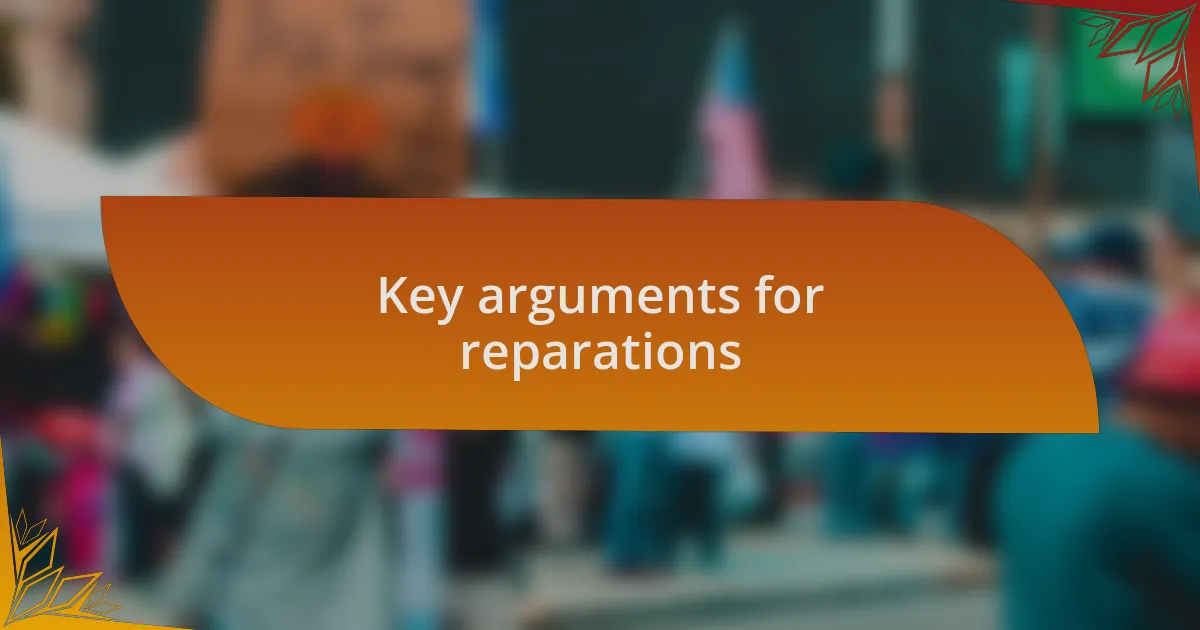
Key arguments for reparations
One of the key arguments for reparations rests on the undeniable recognition of historical injustices and their lasting impact. Personally, I’ve seen firsthand how systemic inequalities continue to affect communities, leading to a cycle of disadvantage. When I engage in discussions about reparations, I can’t help but ask: how can we truly claim to value equality while ignoring the deep scars left by slavery and discrimination?
Another compelling argument relates to moral responsibility. I’ve often reflected on the idea that with privilege comes responsibility. This notion resonates deeply when I think about reparations, as it highlights the obligation of society to acknowledge and rectify past wrongs. If we don’t confront this uncomfortable truth, are we not complicit in the perpetuation of injustice?
Furthermore, there’s a strong economic rationale behind reparations. In my discussions with friends and colleagues, I frequently emphasize that addressing the wealth gap can lead to broader economic benefits for everyone. When marginalized communities receive the support they rightfully deserve, we create a more equitable landscape that ultimately benefits society as a whole. Have we considered how uplifting these communities could lead to increased economic productivity and stability for all? It’s a thought that often lingers in my mind as I advocate for reparative measures.
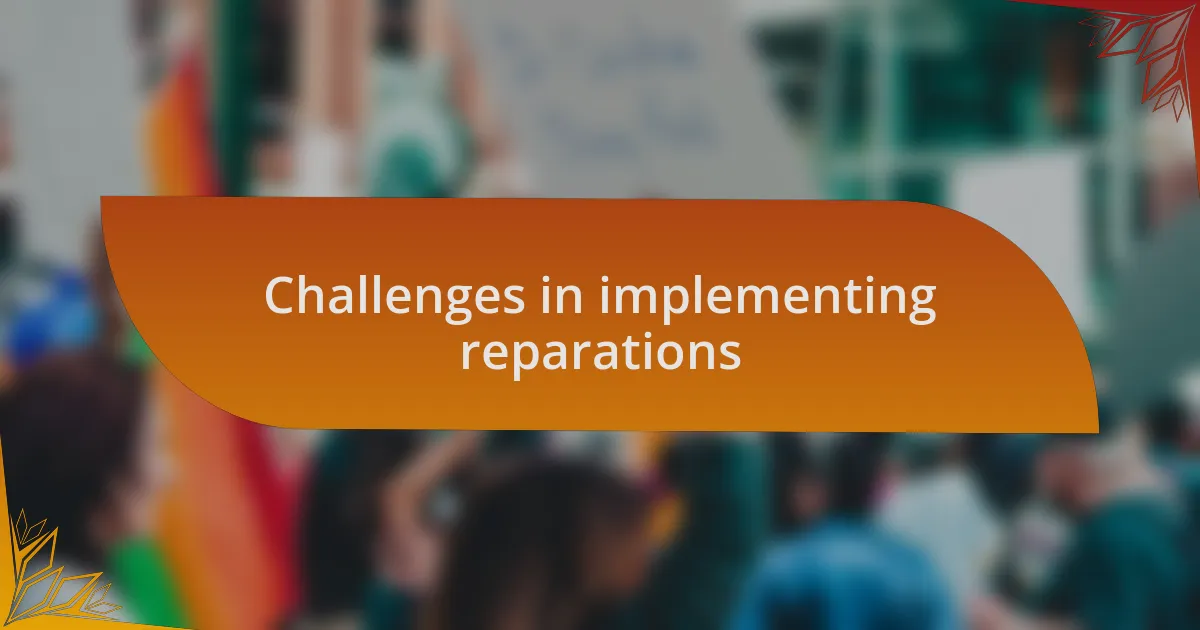
Challenges in implementing reparations
The implementation of reparations faces numerous challenges, particularly the question of how to determine eligibility. From my perspective, the complexities of defining who qualifies for reparations can lead to contentious debates. When I reflect on this, I often wonder: how can we create a fair system that acknowledges the fullness of historical injustices while avoiding exclusion or ambiguity?
Funding reparations is another significant hurdle. In conversations I’ve had, there’s a palpable tension around the sources of financing these reparative measures. I can recall a discussion where someone eagerly asked, “Where will the money come from?” This question underscores a reality that many people grapple with; securing financial resources can feel daunting, and without a clear plan, the whole initiative risks falling flat.
Moreover, political will can be elusive when it comes to enacting reparations legislation. I’ve observed a pattern where discussions around reparations often stall in political arenas, as various interests and agendas come into play. It makes me think: if we can’t rally collective support to address historical wrongs, how might we ever cultivate the genuine societal change we desperately need?
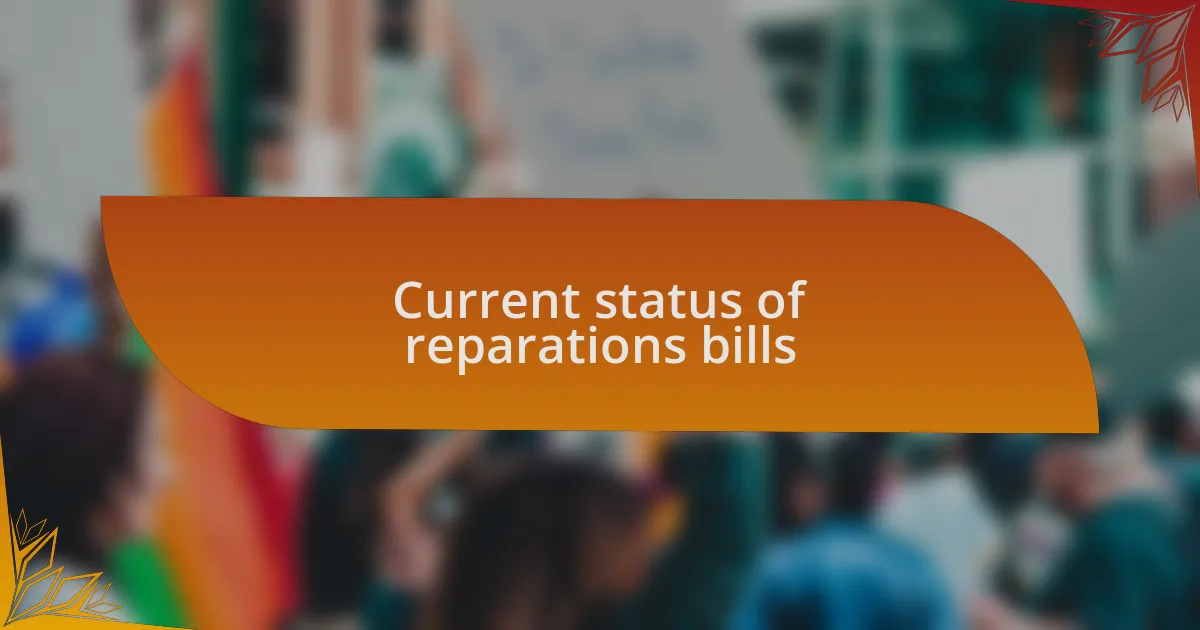
Current status of reparations bills
The current landscape of reparations bills reveals a complex web of legislative efforts across various states. For instance, California has taken significant steps by establishing a task force to explore reparations, a move I find quite groundbreaking. It raises the question: can this be a model for other states, or will it remain an isolated case that fails to gain traction?
Interestingly, other states have seen similar initiatives, yet many have stalled. I recall watching a news segment highlighting a proposed bill in New York that garnered initial enthusiasm but ultimately fizzled out amidst political maneuvering. It makes me wonder if public support alone is enough, or if internal political dynamics will continue to undermine such critical legislation.
In Congress, the push for federal reparations legislation remains an uphill battle. The introduction of bills has sparked discussions, but the reality is that meaningful progress feels painfully slow. I can’t help but think about how history tends to repeat itself when there’s a lack of commitment; if we don’t act decisively now, will we still be having these same conversations decades from now?
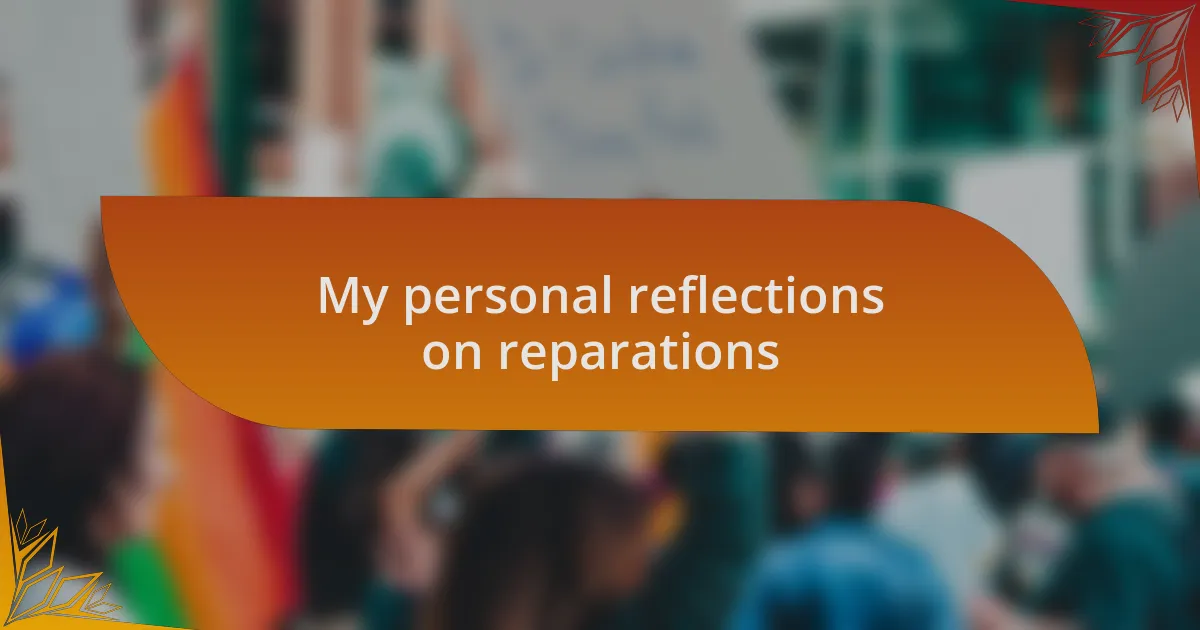
My personal reflections on reparations
Reflecting on reparations, I often find myself grappling with the weight of history. When I think about how systemic injustices have affected generations, it feels deeply personal—not just a political issue. This isn’t just about acknowledging the past; it’s about envisioning a path toward righting those wrongs.
One moment that struck me was during a community meeting where we discussed reparations. Listening to people share their experiences crafted a vivid picture of the emotional toll that inequities have wrought. I couldn’t help but ask myself, “What is the worth of an apology if it isn’t accompanied by tangible support?” It reinforced my belief that reparations must be meaningful, something that empowers individuals and communities.
As I immerse myself in this topic, I can’t shake a sense of urgency. Reparations are not simply a checkbox on a legislative agenda; they represent a moral obligation that we must confront head-on. I often wonder—do we have the courage to commit to this journey for justice, or will we continue to sidestep our responsibility?
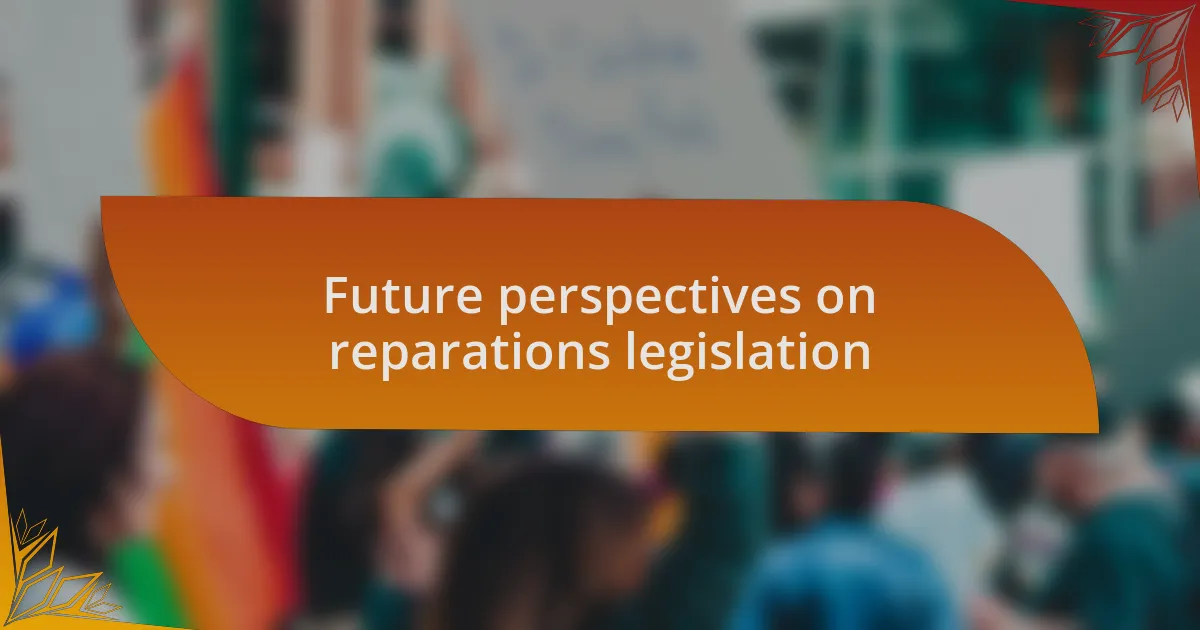
Future perspectives on reparations legislation
Looking ahead, the future of reparations legislation is still very much in flux. Every conversation I have reminds me of the diverse viewpoints within communities, which can both energize and complicate the movement towards reparative justice. When discussing next steps, I often think about how personal stories can serve as powerful catalysts for legislative change. Are we amplifying these voices enough to push the narrative forward?
As I envision what reparations could look like in practical terms, I can’t help but feel a mix of hope and skepticism. Will financial reparations become a reality, or will they continue to be stymied by bureaucratic hurdles? I remember a conversation with an elder in my neighborhood who recounted her family’s struggles and resilience. She said, “What we really need is acknowledgement and a solid plan, not just checks.” Her sentiments resonate deeply; tangible reform must be anchored in community needs and history.
Moreover, I believe that any future legislation should prioritize education on the history of injustice. How can we expect to move forward without a common understanding of the past? This potential legislation could redefine curricula, ensuring that future generations recognize the systemic issues we face today. By integrating these lessons into educational frameworks, we might foster a broader societal commitment to reparations, transforming a once-divisive issue into a shared goal for justice and healing.